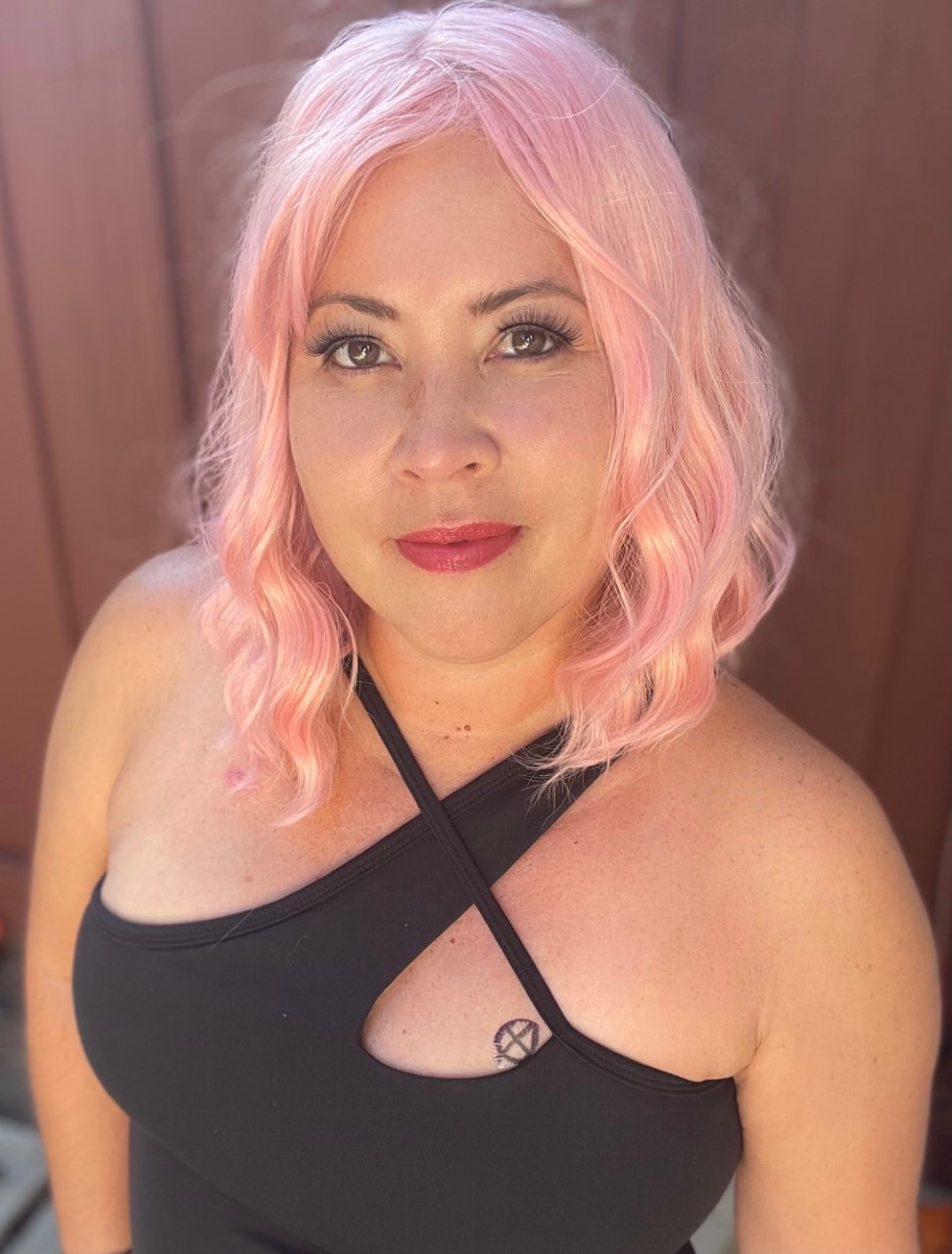
Breast Cancer: One Woman's Journey.
Introduction to Jennifer Tipton, by Warrior Ambassador Community Lead Lisa Johnston:
October is Breast Cancer Awareness Month. As such, I wanted to take the opportunity to introduce my friend, and fellow yoga teacher, Jennifer Tipton to our community. Jennifer has been teaching yoga, fitness, and movement classes since 1998. She has a master of Science in Exercise and Sports Psychology and has her own 200 hr yoga school, Get Zen School of Yoga. Jen has a quick laugh, a warm personality, and a knack for making her students feel safe and supported.
Our friendship started several years ago on social media. Over the years, we came to know each other better, and during the Covid lockdown, we became virtual “workout buddies”. We dragged ourselves out of bed every Friday morning to take a live TRX class together. It was fun hearing the coach shout out our names to encourage and correct us. It was nice knowing that I wasn’t “struggling” alone. Last December (2020) she was diagnosed with an extremely aggressive form of breast cancer. I have been inspired by her strength, insight, and vulnerability as she faced her diagnosis and valiantly fought the disease. Jennifer is a true warrior!
I’ve invited Jennifer to share her experience in a question-and-answer format. I believe that her perspective and journey will be an inspiration to all who read it.
Lisa - When you think about the word Warrior, what description comes to mind, and what qualities have you used as you have been fighting breast cancer?
Jennifer - I always knew that women who are diagnosed with breast cancer are called warriors. Now I know why. It’s a fight. Every. Single. Day. Being a warrior means that we make the choice not to become a statistic. Instead, we choose to fight for our lives. Throughout this entire year, I have been grateful to be alive.
Recovering from chemo and then going back a few weeks later to do it all over again is a huge battle. You’re making the conscious decision to walk into a situation that you know is going to make you feel sick and terrible, but you choose to do it so many times because you have cancer to kill. I had to do that over and over again for four months straight. My yoga teacher Shiva Rea called chemo the fierce nectar. During my infusions, I would imagine the red liquid going into my body and killing all the cancer cells. Some days are more difficult than others and those are the moments when you really have to fight.
I recall a few days after a brutal chemo session following another dose of Neulasta. This is a standard medication given 24 hours after chemo to keep the white blood cell count up. It works but it has painful side effects. My bones felt like they were being torn from my body. I reflected on my existence on this earth. Was I happy with my life? Did I have any regrets? These are the types of questions you might ask yourself when you go to the dark side. I actually thought about this for some time and decided that I was happy with my life and the way I lived it. It gave me a sense of peace. Was I really ready to die? The answer was and still is NO. No, I choose to fight. I am going to survive this. Cancer is a mental rollercoaster.
Lisa - What is the greatest tool that you have used while fighting breast cancer?
Jennifer - The greatest tool that I have used other than information from my second opinions and support groups have been my personal journal. I am not talking about my online journal, although that one was incredibly wonderful for support and keeping people informed.
My personal journal is where I continue to document everything, every treatment, each pill, every workout, the hours of sleep, every side effect, etc. My oncologist would smile each time he came into the room and saw my journal covered in gold glitter. It states: Yoga is like life- It’s a balance of holding on and letting go.
During chemo, I would write down all my symptoms and describe how I was feeling emotionally. The following week I would check back in to see how I had progressed and recovered. Reading through my journal helped me after the next round when I had to do it all over again. It would remind me that everything is temporary, even this.
Lisa - What are some good resources for those who are undergoing breast cancer?
Jennifer - Knowledge is power. When you get a diagnosis of breast cancer there is so much fear of the unknown. You may start treatment, but you wait until the next appointment to see if anything worked. My oncologist literally monitored my giant tumor with a tape measure. I began educating myself as soon as I could. I joined several support groups. I signed up with a local nonprofit organization for a mentor. I talked to countless women about their experiences. I asked so many questions. Take lots of notes. Ask the questions, all of them.
Some of my best supporters are strangers who are now my pink sisters. These are the women who are going through and have survived breast cancer. I joined several online groups as well. There are so many communities that are unique to each kind of cancer and treatment. For example, there is a group dedicated just to the type of surgery I had. There are almost 17,000 women in that one. Women I have never seen or spoken to have mailed me supplies and things that they found useful on their own journey.
Ask for help. Lots of it. Most people will want to help you, but they won’t know how to. Ask for specifics. Think about what you need to help get you through treatment. If you don’t know yet, then ask others what worked for them.
Lisa - What kinds of friends bring joy?
Jennifer - I’m eternally grateful for my phenomenal support system. I have friends who listen instead of giving advice. Sometimes people just don’t know what to say, and that’s ok. I got lots of cards and gifts. The gestures were always thoughtful and sweet. I had one friend who texted me something uplifting every very single morning for months straight, even when she didn’t hear back from me for days.
Simple things give me joy now; like waking up and being able to move well. I call people more often now instead of texting. I enjoy working, taking on fun projects, and serving in my community. All these things help me to look at the bigger picture.
Live your life. Don’t wait for opportunities. Surround yourself with the type of people who you know you would want by your side if anything bad ever happens. You just don’t know when things will get difficult. Continue to support one another. Spend more time with good people. Do things that make you happy. Make time for these things.
Lisa - What are some of the things that help to keep you resilient? How do you goal set while being in the midst of this? What does that look like?
Jennifer - Cancer treatment is long and incredibly difficult. Setting short-term goals helped me tremendously. I tried not to think about the next phase of treatment. Instead, I focused on small steps. My goals ranged from walking down the block a few days after chemo to showering without my mom’s help after my big surgery. I also keep my eye on life after cancer, knowing that I am getting closer every day.
I keep doing things that I enjoy. Even during the darkest days of chemo, I would throw on my pink wig and take a yoga selfie. I keep in touch with my friends on the days when I feel like talking. I really enjoy using social media during treatment. Documenting my experience on my stories helped me so much. I was always alone in the waiting room so I would talk to my phone and post to a limited number of friends who knew exactly what I was going through. It also helps me to go back and watch those small confessions...to see how much has happened and how far I have come in fighting this disease.
I also teach yoga when I can. During chemo I felt very supported when I would show up to teach in my head scarf. I felt so immersed in the cancer world with appointments and support groups and I found teaching to be a break from cancer. My students weren’t there to hear about cancer, but to take a class with me.
I tried to establish some form of normalcy with my daughter even though things were not normal. I went to her softball and basketball games when I felt well enough to attend. I hosted play dates and we spent lots of time in the backyard just hanging out.
Lisa - How did you keep your connection with Self when you were going through such a dehumanizing and disembodying experience? You were alone.
Jennifer - Cancer treatment during Covid is incredibly lonely. You go to the hospital alone. You can’t sit next to anyone else due to social distancing rules. You don’t ever see the faces of the doctors and nurses because they are covered in masks.
I never had anyone holding my hand during diagnosis. There weren't any chemo buddies. During infusions I was either alone behind a closed curtain or completely shut off from the rest of the world in a separate room. When I read about other cancer stories, I always am amazed that there was someone there to share in the experience. I often think about what would have been different if I had someone with me all the time.
Ironically, I actually looked forward to my appointments. Not because of the treatment itself, but because I had the opportunity to talk to people in person. Being immunocompromised during a pandemic is rough. I had the majority of my social interaction when I was at the hospital. I chatted a lot with the nurses. The nurses are all so wonderful even if they are not allowed to hug me.
Lisa - What have you done that has been really helpful to you?
Jennifer - My yoga practice helped me to stay connected to my Self. Simple routine kept me going. I met with a yoga group at the same time every week. There is comfort in ritual.
I changed my nail polish every two weeks with each new infusion. I bought colorful shirts with special zippers to accommodate my port. I got some fun wigs.
After my hair, eyebrows, and eyelashes fell out I faked having hair and had fun I it. I found a company that makes wigs out of your own hair. I experimented with false lashes and eyebrow liner. I did whatever I needed to do to feel like I looked like my normal self. It helped.
I think a lot about my little girl. She watches every move I make. We constantly communicate about what is going on. The next phase of treatment is radiation, and she talks about mommy going into the hospital to zap the cancer cells.
Lisa - What does that support circle look like for you, and what are some of the things that you wish you had known before going through this?
Jennifer - Cancer deeply affects everyone who is close to you. My family has been incredibly supportive. My husband has not left my side. He continues to cheer me on. During chemo he waited on me while keeping the mood light for our daughter. He did stuff that he is good at, like when he emptied my drains on schedule three times a day after surgery. He even kept a spreadsheet of how much fluid he took out so he could email it to the nurse. My mom flew out to help with my 6-year-old daughter so that he had more time to take care of me. I hired someone to come to the house three days a week to take care of household tasks like dishes and laundry. I let myself focus on self-care and healing. My energy is spent on recovery and doing things that I enjoy.
My daughter is a ray of sunshine. I found that it was better for all of us to involve her in my treatment. She helped me pick out wigs. We talk openly about her feelings. We worked with a social worker from the hospital as well. We read lots of children’s books about cancer and completed workbooks together. Art is very therapeutic for her. She used to draw pictures of me teaching yoga. During chemo she started drawing pictures of me lying in bed with my head scarf on. It seems like the most difficult part for her was when my hair was falling out. One evening my husband shaved my head and she ran into her room and burrowed into child’s pose.
I’m not going to give up. I will survive. I am showing her how strong I am. Even though she may not understand now, one day she will.
Lisa - What would you want to tell people now?
Jennifer - I’m still going through treatment, but in the beginning, I wish I would have known how too much cancer talk can sometimes be excessive and not so helpful. Despite how useful the support groups are, they can be incredibly overwhelming. It’s easy to get immersed in everyone else’s diagnosis and treatment and compare notes. Sometimes I would feel guilty because my chemo was going smoother or my recovery from surgery was going better than I thought it would. Then I remember that sometimes the people who post in some of these groups are the ones having more complications. Sometimes the ones who do better with treatment don’t have as much to say. They just move on to the next phase. I almost didn’t do the double mastectomy with reconstruction because I read so many horror stories. Fortunately, the recovery wasn’t near as bad as I thought it would be.
Lisa - What is your key “Takeaway" you want people to get after ready this blog?
Jennifer -
- Getting the checks matter. Educate yourself. Check your boobs
- Screening matters. Mammograms matter. I have no family history of breast cancer. I do all the right things with my lifestyle. I’m relatively young. My mammogram in 2019 was totally fine... I was completely shocked when my next mammogram only a year later showed Stage 3 ER/PR + breast cancer that spread to my lymph nodes.
- Cancer doesn’t care about your diet, genetics, or how much you exercise. Anyone can get it. I feel grateful that mine was caught sooner than later. Because of the aggressive treatment plan my chances of survival are high.
Lisa - How did your knowledge of yoga and your personal practice help you through this?
Jennifer - My yoga community came through for me. I shared. I breathed. I felt supported. But most of all, they made me feel like I was still me and not this disease. I remember I would be stuck in bed feeling too weak to walk around. Sometimes my colleagues would text me asking me technical questions about a yoga pose or something similar. It made me feel like myself, like this pain wouldn't last.
During the long days between the scary mammogram and diagnosis I practiced mindfulness and mediation. I hiked. I immersed myself in nature. I celebrated the holidays and went on a small weekend trip. I tried to hope for the best. I focused on everything that I have every learned about positive psychology. Mentally, diagnosis was the most challenging part of my cancer journey.
Yoga and fitness helped me survive cancer treatment and kept me emotionally uplifted and mentally strong. On the days I could barely move I crawled across the floor to find my yoga bolsters. I rested. I meditated. I never gave up hope. I talked about my experience with others. Amazingly, during the weeks when I exercised more, my tumors had more shrinkage. I don’t think that’s a coincidence... Sometimes I think that all these years of yoga practice have prepared me for this.
I wonder what I will be thinking a year from now or how my experience will look to me then. For now, I will continue to put one foot in front of the other.



